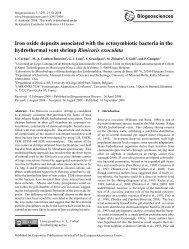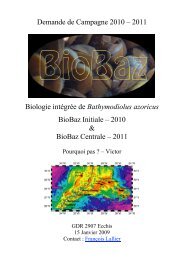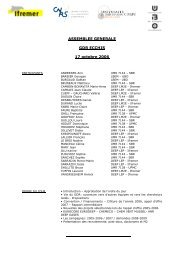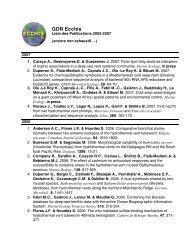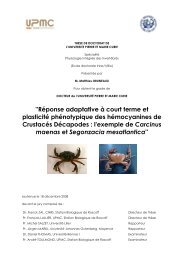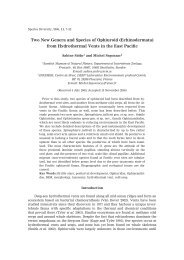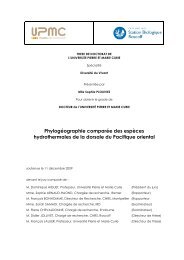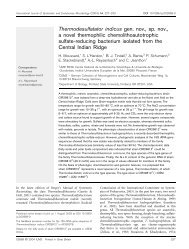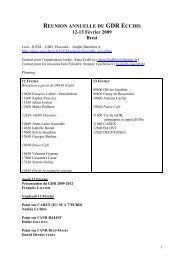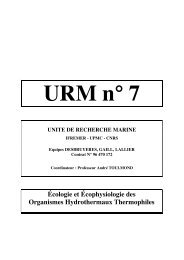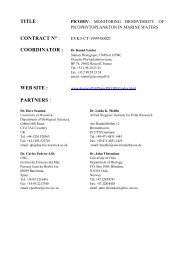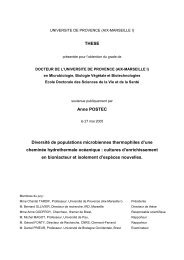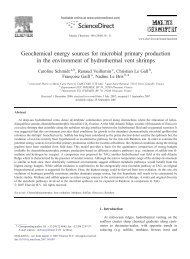European Ocean Research Fleets - uefiscdi
European Ocean Research Fleets - uefiscdi
European Ocean Research Fleets - uefiscdi
You also want an ePaper? Increase the reach of your titles
YUMPU automatically turns print PDFs into web optimized ePapers that Google loves.
A4. Existing partnerships in Europe<br />
A4.1. Introduction<br />
Investments in marine research throughout Europe<br />
seem not to increase or even decrease compared with<br />
other research fields. To face that fi nancial issue, different<br />
cooperation schemes in Europe exist on different<br />
levels, formal and informal, to act effectively<br />
towards an enhanced use of resources.<br />
Such cooperation has mostly been initiated when:<br />
– Large investments and resulting running costs could<br />
not be realised on a national basis only; e.g. shared<br />
investment and running costs for RV Thalassa by<br />
France and Spain.<br />
– Bilateral or multinational political interests encouraged<br />
such cooperation; e.g. shared investment and<br />
running costs for RV Alliance by some NATO members.<br />
– Existing large equipment, e.g. <strong>Research</strong> Vessels, are<br />
forced to be used more efficiently by national controlling<br />
mechanisms (German vessels within the <strong>Ocean</strong><br />
Facilities Exchange Group, OFEG).<br />
– Scientific and/or technological interests on a bilateral<br />
or multinational basis are the driving forces (NERC/<br />
UK and the NSF/USA; IMR/Norway and the Marine<br />
Institute/Ireland; AWI/Germany and Ifremer/France).<br />
A4.1.1. No-cash-flow exchange: the barter system<br />
In barter systems, existing partner’s infrastructures<br />
(e.g. ships, large equipment) are financed and provided<br />
by the owner on loan to the partner for a certain<br />
period of time. In turn, the owner receives the right of<br />
usage of the partner’s infrastructure in the near future.<br />
The value of single-case usage is generally counted in<br />
points per day and balanced out on an annual scale.<br />
Clearly, such a system can work only for partners who<br />
own and can make available infrastructure which is of<br />
value to others, either because others do not own or<br />
need the infrastructure or because their infrastructure<br />
is not available at a certain location at a certain period<br />
of time. This system allows for a more cost effective<br />
use of existing infrastructures. Such barter systems<br />
can easily be initiated between partners who own specific<br />
infrastructures; candidates who do not own such<br />
infrastructures are excluded from them.<br />
A4.1.2. Shared investments and running costs<br />
Such systems are initiated if a single partner needs<br />
infrastructure but cannot afford, or is not willing,<br />
to pay the necessary investment and/or running<br />
costs on its own. This partner might also not be able<br />
to use the infrastructure effectively and sufficiently. The<br />
advantage is that costs can be individually adapted<br />
to each partner according to its specifi c needs. They<br />
are scheduled on a long-term scale. Such a system<br />
needs a partner who acts as the lead body. Money<br />
flows from all partners to the acting partner and in turn,<br />
partners have access to the infrastructure according<br />
to their contribution and on individually based case<br />
agreements. The disadvantage appears to be that it is<br />
difficult to leave such partnership after the programme<br />
has ended.<br />
A4.1.3. Charter contracts<br />
This is the classic model used in the merchant fleet. It<br />
has been applied many times within the field of academic<br />
research. In this system, owners of infrastructure<br />
are not only public institutions but also<br />
private companies. They contract their infrastructure<br />
against cash-flow. Contracts concern individual<br />
cruises on a certain vessel or on a long-term scale, e.g.<br />
a certain amount of days per year for several years as<br />
well. While the model principally provides much fl exibility,<br />
researchers as charter clients depend on the<br />
market with respect to type and quality of infrastructure,<br />
prices and availability.<br />
A4.1.4. Joint projects/programmes<br />
In joint projects, partners may agree to share infrastructure.<br />
The time period of the agreement is generally<br />
limited to the project’s lifetime. Common cruises<br />
during a project are an example. Usually, no cash flows<br />
between partners. On a broader and longer scale, programmes<br />
may provide information on available and<br />
planned infrastructure and may initiate future research<br />
programmes jointly by funding agencies. As a general<br />
basis, a Memorandum of Understanding may initiate<br />
cooperation between partners; e.g. aiming at getting<br />
optimal training on complicated infrastructure.<br />
A4.2. Description of existing partnerships<br />
(see examples Appendix 3 page 45)<br />
A4.2.1. Exchange of shiptime or equipment or instruments:<br />
the barter system<br />
The <strong>Ocean</strong> Facilities Exchange Group (OFEG) consists<br />
of six <strong>European</strong> institutions and ministries<br />
(Ifremer (8) /France, NERC (9) /UK, BMBF (10) /Germany,<br />
NIOZ (11) /Netherlands, IMR (12) /Norway, CSIC-UTM (13) /<br />
Spain). It runs a system which announces opportunities<br />
such as vessels’ bartering time and offers of use of<br />
large equipment. The agreement, signed in 1996, has<br />
8 Institut Français de Recherche pour l’Exploitation de la Mer<br />
9 Natural Environment <strong>Research</strong> Council<br />
10 Bundesministerium für Bildung und Forschung<br />
11 Nederlands instituut voor Onderzoek der Zee<br />
12 Institute of Marine <strong>Research</strong><br />
13 Consejo Superior de Investigaciones Científi cas - Unidad de<br />
Tecnología Marina<br />
<strong>European</strong> <strong>Ocean</strong> <strong>Research</strong> <strong>Fleets</strong> | 25



